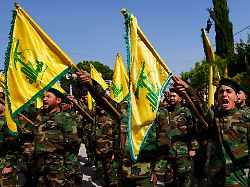Hatred of Israel unites terrorists
Why Hezbollah won’t enter the war
By Kevin Schulte
November 19, 2023, 11:09 a.m
Listen to article
This audio version was artificially generated. More info | Send feedback
Hamas is celebrated in parts of the Islamic world for its massacres of Israelis, including Hezbollah. Since October 7th, there has been speculation about a possible entry into the war by the Lebanese terrorist group. Hamas and Hezbollah are less green than expected.
Hatred of Israel is their common denominator: Hamas and Hezbollah have been terrorizing their Jewish neighbors for decades. Since the brutal massacre by Hamas terrorists from the Gaza Strip, Hezbollah has been firing rockets at Israel from Lebanon. There are individual skirmishes on the Israeli-Lebanese border with injuries and deaths.
But Hezbollah has not yet officially interfered in the Israel war. So far there can be no talk of coordinated actions together with Hamas.
Hezbollah leader Hassan Nasrallah’s first speech after October 7 was ambiguous. On the one hand, he called the massacre of over a thousand Israelis a “heroic act” and that “all options are now on the table” for his group, including entry into war. But Nasrallah also spoke of a “purely Palestinian action,” which caused experts and observers in the West in particular to breathe a cautious sigh of relief.
The world should be kept in the dark about what Hezbollah is planning, where and when. Iran is crucial anyway, says military expert Thomas Wiegold at ntv. “It is certainly Iran’s wish to leave this pending and to keep threatening to do so.”
Hezbollah, like Hamas, is classified as a terrorist organization by Western countries. She controls Lebanon militarily and also politically through her party.
Iran is Hezbollah’s biggest supporter, helping financially and with arms supplies. Therefore, the Iranian leadership alone decides whether Hezbollah is involved in the war against Israel or not, explained security expert Frank Umbach in an ntv interview.
At least 150,000 rockets
This signal obviously did not exist until now. The deterrence seems to be working, military analyst Hendrik Remmel from the Bundeswehr think tank GIDS points out the US aircraft carriers in the region. “This is an enormous projection of power in the Mediterranean, against Iran and therefore also Hezbollah. The Americans have clearly signaled that they will not tolerate a conflagration.”
But Iran is currently not interested in escalating the conflict, Remmel adds to ntv. “Iran repeatedly points out that the Hamas attack was an attack without support. I am unable to judge whether that is true or not. But it is important to interpret this rhetoric: Iran is distancing itself Within the scope of his ideological possibilities, he definitely expects increased interference in the conflict.”
If Hezbollah were to go to war against Israel, the consequences would be dire. The power of the Lebanese terrorists is immense. Hezbollah is said to have at least 150,000 rockets.
If parts of the huge missile stockpile were fired at the same time, even Israel’s missile defense would be overwhelmed. “The rockets are not stored in military barracks, but in densely populated residential areas. And they have the ability to fire hundreds, if not thousands, at Israel at the same time. The Iron Dome alone is not enough,” says Arye Sharuz Shalicar, spokesman for the Israeli military, clear in the ntv interview. “We have several anti-missile systems that were developed in Israel, among others, to save lives in an emergency.”
Shiites vs. Sunnis
But a joint war between Hamas and Hezbollah against Israel remains unlikely. The terrorists from Lebanon will probably continue to fire rockets selectively at the southern neighboring country without working directly with Hamas – also because, apart from their hatred of Israel, they have very different views: Both are Islamist organizations, but Hezbollah is a Shiite one Hamas is a Sunni terrorist group within Islam.
These beliefs are over a thousand years old. In the seventh century, after the death of Prophet Mohammed, the question of who should be his successor was debated in the Islamic world. Some believed that Mohammed had not named anyone, so his successor should be chosen – these were the later Sunnis. The others – the later Shiites – wanted Muhammad’s son-in-law Ali as the new leader.
The Sunnis are clearly in the majority these days. Around 85 percent of the approximately 1.6 billion Muslims in the world are followers of this faith. However, there are entire countries where the majority of the population are Shiites, this is the case in Iran and Iraq.
Sunnis and Shiites agree on most ideological issues, but the different interpretations regularly cause conflicts. This is why Sunni Saudi Arabia, for example, does not get along with Shiite Iran. Therefore: Hamas and Hezbollah pursue the same goal: they want to wipe out Israel. But they are not natural partners.
“Learned something again” is a podcast for those who are curious: Why would a ceasefire probably just be a break for Vladimir Putin? Why does NATO fear the Suwalki Gap? Why does Russia have iPhones again? What small behavioral changes can save 15 percent energy? Listen in and get a little smarter three times a week.
You can find all episodes in the ntv app RTL+, Amazon Music, Apple Podcasts and Spotify. For all other podcast apps you can use the RSS feed.
You have a question? Please send us an email to [email protected]
